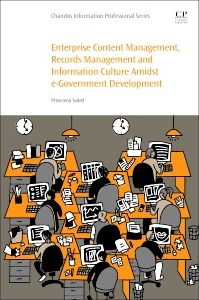Description
Enterprise Content Management, Records Management and Information Culture Amidst E-Government Development
Author: Svärd Proscovia
Language: English
Subject for Enterprise Content Management, Records Management and...:
Keywords
Accountability; Business process management; E-Government; E-archiving; Enterprise content management (ECM); Information; Information and records management; Information culture; Information management; Information management and business success; Life-Cycle Model; Records; Records Continuum Model; Records management and information resources; Records management and provenance; Registration; Structured information and unstructured information; Transparency and information management
Support: Print on demand
Description
/li>Contents
/li>Biography
/li>Comment
/li>
This book identifies key factors necessary for a well-functioning information infrastructure and explores how information culture impacts the management of public information, stressing the need for a proactive and holistic information management approach amidst e-Government development.
In an effort to deal with an organization's scattered information resources, Enterprise Content Management, Records Management and Information Culture Amidst E-Government Development investigates the key differences between Enterprise Content Management (ECM) and Records Management (RM), the impact of e-Government development on information management and the role of information in enhancing accountability and transparency of government institutions. The book hence identifies factors that contribute to a well-functioning information infrastructure and further explores how information culture impacts the management of public information. It highlights the Records Continuum Model (RCM) thinking as a more progressive way of managing digital information in an era of pluralization of government information. It also emphasizes the need for information/records management skills amidst e-Government development. Ideas about records, information, and content management have fundamentally changed and developed because of increasing digitalization. Though not fully harmonized, these new ideas commonly stress and underpin the need for a proactive and holistic information management approach. The proactive approach entails planning for the management of the entire information continuum before the information is created. For private enterprises and government institutions endeavoring to meet new information demands from customers, citizens and the society at large, such an approach is a prerequisite for accomplishing their missions. It could be argued that information is and has always been essential to all human activities and we are witnessing a transformation of the information landscape.
2. Records management
3. Enterprise content management (ECM)
4. Two principles governing the management of records
5. Differences and similarities between enterprise content management and records management
6. Information culture
7. Accountability, transparency, and the role of information management
- Presents research with broad application based on archives and information science, but relevant for information systems, records management, information culture, and e-government
- Examines the differences between Enterprise Content Management and Records Management
- Bridges a gap between the proponents of Enterprise Content Management and information professionals, such as records managers and archivists




